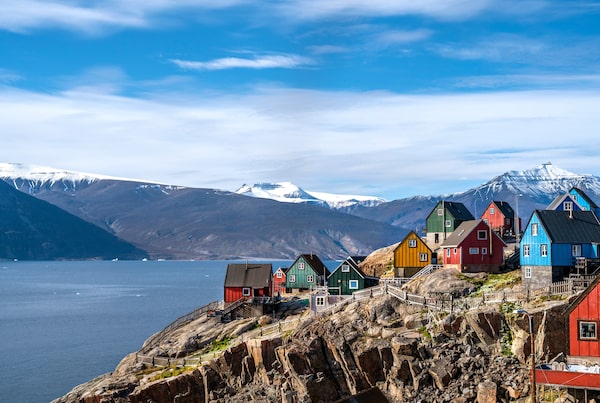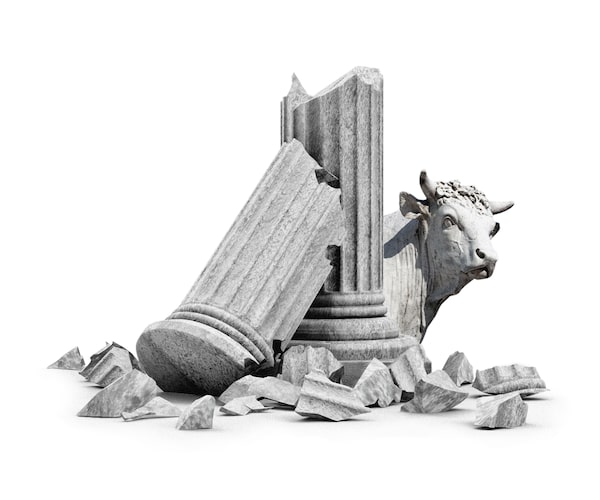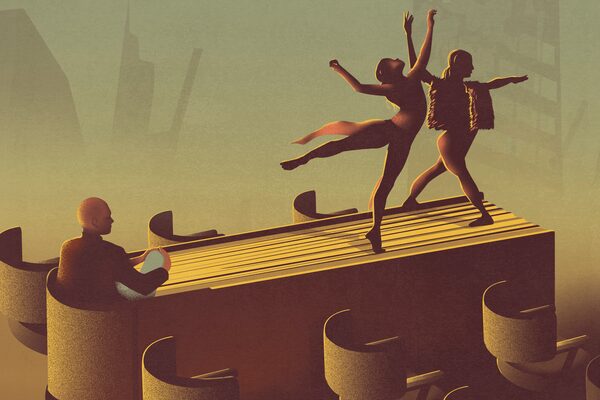Good morning, and welcome to the weekend.
Grab your cup of coffee or tea, and sit down with a selection of this week’s great reads from The Globe.
In this issue, reporter Erin Anderssen dives deep into the polarizing debate on medically assisted dying for people with mental illness, who will soon be eligible to apply for medical aid in ending their life. She pored over more than 300 parliamentary committee submissions, and spoke to doctors and patients on both sides of the debate over what’s shaping up to be the most controversial expansion of MAID since a Supreme Court ruling led to the legalization of euthanasia in 2016.
Historian Russell Potter returns to an Arctic that’s at once familiar and in the midst of unrecognizable changes as climate change makes its advance. And we pick apart the not-so-holy trinity of ideas that investors once considered indisputable before the pandemic.
If you’re reading this on the web, or it was forwarded to you from someone else, you can sign up for Great Reads and more than 20 other Globe newsletters on our newsletter sign-up page. If you have questions or feedback, drop us a line at greatreads@globeandmail.com.
As Canada hurtles toward a unique life-or-death experiment, questions about safeguards linger
Dr. Madeline Li has told a parliamentary committee that she has 'significant concerns' about MAID's expansion to people with mental illness.Ian Willms/The Globe and Mail
When eligibility for assisted dying expands to people struggling with mental illness early next year, Canada stands to have one of the most liberal euthanasia laws in the world. It will join only a few countries that allow assisted dying for mental illness. With only four months to go, the mental health community has yet to reach a consensus, and there are still no national standards and no transparent review process in place to watch for mistakes. Does Canada have time to get it right?
Revisiting the Northwest Passage: A journey to the new and the familiar

Brightly coloured homes perched on a cliff in Uummannaq, Greenland.MICHELLE VALBERG/The Globe and Mail
Russell Potter embarks on a nearly month-long voyage to the Northwest Passage to see what may be in store for its climate future. With less ice and more tourists in the Arctic as the years pass, he writes, there’s a danger that it could be transformed into something akin to a colder Caribbean: a constellation of communities whose livelihoods are tied to tourism and changed in ways to draw more visitors. But even as more people make the journey, he says, the sense of impermanence that’s characteristic of the landscape will endure. “ … We are all visitors here, our presence a temporary one, a reminder of the short span of human beings’ own earthly existence as well as of our self-made perils to come,” Potter writes.
Sacred tenets of the bull-market era are unravelling

Broken Classical columns with "Bull" in wreckage. Photo illustration by The Globe and Mail.Photo illustration by the Globe and Mail/iStockPhoto / Getty Images
The pandemic has undone three ideas once heralded by investors as irrefutable. But these ideas that dominated financial markets for the past decade prepandemic are colliding with geopolitical and economic realities on the ground. Among them are the notions that interest rates are destined to remain “lower for longer” and that China is the long-term global engine for growth – a case that was easy to make because of its demographics, Ian McGugan says, but has since been seriously challenged as its labour force ages and shrinks. While it’s tempting to bet there’ll be a revival of past trends, McGugan writes, there’s a saner strategy to consider.
CUPE members picket at Queen’s Park in Toronto when education support workers across Ontario walked off the job on Nov. 4.Melissa Tait/The Globe and Mail
After education workers risked millions of dollars in fines to protest in support of fair wages, Ontario Premier Doug Ford promised to rescind his notwithstanding clause that barred them from demonstrations and make an “improved offer” to settle the dispute. But what if he hadn’t? Jeff Gray and Caroline Alphonso report unions had much wider action in mind, including temporarily shutting down ports and perhaps the Confederation Bridge to Prince Edward Island.
OPINION: Six portraits of Indigenous resistance, from the Constitution Express to Idle No More

Sylvia McAdam Saysewahum, one of the four co-founders of the Idle No More movement, speaks on Parliament Hill on Dec. 28, 2012.Nadya Kwandibens/Red Works/The Globe and Mail
A decade ago, Idle No More made Indigenous issues visible in a new way, and photography was vital to that – as it was in other moments of defiance to colonialism. Now, the subjects of six photos, Wenecwtsin; Waneek Horn-Miller; Sylvia McAdam Saysewahum; Nikki Komaksiutiksak; Sabina Dennis; and Antoine Mountain look back and speak for themselves.
Inside the weird and wild making of Margaret Atwood’s MaddAddam ballet

Illustration by Romain Lasser
When Margaret Atwood first heard about the idea to adapt her MaddAddam trilogy of postapocalyptic novels into a ballet, her reaction was: I’d like to see that. Now, the play, a sprawling non-linear tale with multiple narrators, overlapping timelines and chimeric, gene-spliced creatures, set in landscapes that include surveillance-state compounds and the ruins of human society after a catastrophic plague, promises to have you dancing for dystopia. See for yourself at the Four Seasons Centre for the Performing Arts in Toronto, where the play will run from Nov. 23 to 30.
John Herdman has been an underdog his whole life
Canadian national men's soccer team head coach John Herdman prepares to step onto the biggest stage of his career at the World Cup in Qatar.DARRYL DYCK/The Globe and Mail
John Herdman knows Canada is the World Cup’s underdog. He wants you to root for them anyway. After coaching the national soccer team to a historic run to snag a berth last March in this month’s FIFA World Cup, Herdman has imbued the Canadian team he will lead in Qatar with a sense of what he calls New Canada: a band of unselfish brothers who play for each other and country, put fear aside, and are willing to take the game to their opponent.
Thanks for reading this week’s issue of Great Reads! Let us know what you think by e-mailing greatreads@globeandmail.com, and see you next weekend.
– Beatrice Paez and Emerald Bensadoun